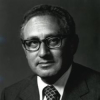Henry A. Kissinger

Henry A. Kissinger
Henry Alfred Kissingeris an American diplomat and political scientist. He served as National Security Advisor and later concurrently as United States Secretary of State in the administrations of presidents Richard Nixon and Gerald Ford. For his actions negotiating the ceasefire in Vietnam, Kissinger received the 1973 Nobel Peace Prize under controversial circumstances, with two members of the committee resigning in protest. Kissinger later sought, unsuccessfully, to return the prize. After his term, his advice has been sought by world leaders...
NationalityGerman
ProfessionStatesman
Date of Birth27 May 1923
CountryGermany
It is not unreasonable for us to desire some options. Some Europeans, I know, believe it is necessary that we guarantee our own destruction to give them the assurances they claim they need. However, to deprive ourselves of options is to paralyze us. ... What do we mean by control of escalation?
It is hard to believe that Kay is no longer among us. But in a way, she will never leave us. Her place in this country will not be filled, nor the void her death leaves on the lives of her friends,
I believe -- and certainly from everything I've been told about him -- that he's an honorable enough man so that he will carry out his assignment with ability and with care.
No, [the U.S.] has made it clear that we consider a peaceful resolution an essential aspect of American foreign policy. This I believe to be a situation understood by China, but again, it is important to not sound too truculent. Taking on a billion-plus Chinese is not an enterprise which one should enter lightly.
When I became security advisor, I became familiar with the so-called SIOP war plans, I called in Secretary McNamara and asked him what they were hiding from me, because I couldn't believe that the National policy would foresee such a level of destructiveness.
We believe that peace is at hand.
I believe it is a mistake to isolate arms control from other areas of policy.
The American temptation is to believe that foreign policy is a subdivision of psychiatry.
It is frankly a mistake of amateurs to believe you can gain the upper hand in a diplomatic negotiation.
I believe in freedom of expression, and I believe that societies thrive when they permit freedom of expression.
I believe that there is a whole set of issues in the world - environment, proliferation, energy, cyberspace - that can only be dealt with on a global basis. The traditional patterns of national rivalry and national competition are not suitable for those cases.
I also do not believe that the United States can let itself be driven into a political role by escalating terrorism, and therefore, the leaders of the Arab world and Arafat should do their utmost to put an end to this and then the United States should do its utmost to produce a political solution.
Competing pressures tempt one to believe that an issue deferred is a problem avoided; more often it is a crisis invited.
I believe that without Watergate we would have had an extraordinary period of success with a strong Nixon and a still vital Brezhnev in power.